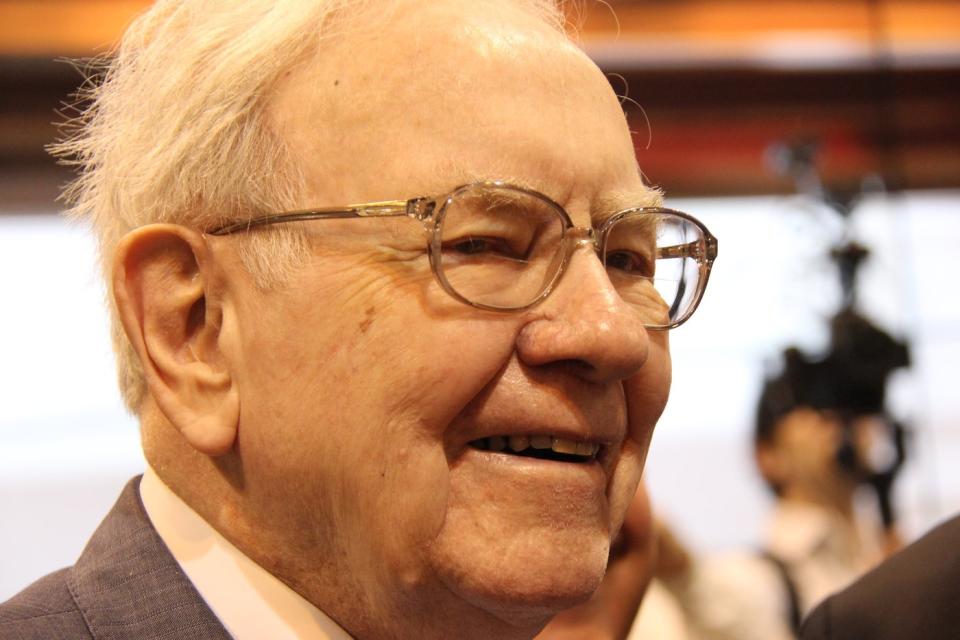Warren Buffett manages a massive portfolio for Berkshire Hathaway (NYSE: BRK.A) (NYSE: BRK.B). As of this writing, Berkshire’s equity holdings total around $400 billion.
By far the largest equity holding in the portfolio is Apple (NASDAQ: AAPL). The Oracle of Omaha poured tens of billions of dollars into Apple stock between 2016 and 2018, amassing a huge stake in the iPhone maker. That stake is now worth around $173 billion.
But Buffett expects another asset held by Berkshire Hathaway to exceed $200 billion in value when Berkshire reports its second-quarter earnings, expected in early August. That is Berkshire’s cash and cash equivalents balance, which Buffett invests almost all of in short-term Treasury bonds.

Building a massive war chest
Buffett hasn’t seen a lot to like in the stock market recently. He’s sold more equities than he bought for six consecutive quarters as of the first quarter this year. That includes two consecutive quarters of selling Apple shares, among others.
It wouldn’t be a surprise if the August earnings report shows additional stock liquidation. And after selling $2.3 billion worth of Bank of America stock (and counting) in July already, he could make it eight quarters in a row.
When you combine those stock sales with Berkshire Hathaway’s cash generated from operations, it starts to add up fast. Berkshire’s Treasury holdings ballooned from $109 billion at the end of the third quarter in 2022 to $189 billion 18 months later.
Buffett knows the Treasury holdings are probably overkill. “Your company also holds a cash and U.S. Treasury bill position far in excess of what conventional wisdom deems necessary,” he wrote in his most recent letter to shareholders. He described the position as “an insurance policy on a fortress-like building thought to be fireproof.”
The Treasury bill investment is intended to be a short-term investment, though. Buffett prefers bonds that mature in a few months over those that won’t mature for years or decades. He learned that the hard way when he invested Berkshire’s cash in 15-year bonds in the 1970s, amid rising inflation, only to regret it later as rising rates decimated the value of his holdings. Now, Buffett insists on safety over yield when it comes to short-term investments.
“We’d love to spend it,” he said of the Treasury bills at this year’s shareholder meeting. “But we won’t spend it unless we think we’re doing something that has very little risk and could make us a lot of money.”
As Berkshire grows bigger and bigger, those opportunities become fewer and farther between. Deploying tens of billions of dollars into acquiring a stock or an entire company — especially one that fits Buffett’s investment criteria — isn’t easy.
Should investors buy Buffett’s biggest holding?
The good news for investors is that they typically handle a portfolio that’s worth less than the $600 billion in combined equities and treasuries Buffett’s in charge of. That gives them a lot more room to maneuver.
That said, Buffett’s growing investment in Treasuries and his inability to find a great investment for Berkshire shareholders suggests it’s increasingly difficult to find a good investment opportunity regardless of the size of your portfolio. Nonetheless, the S&P 500 has produced a total return of about 57% since Buffett started selling more in equities than he purchased back in the fourth quarter of 2022.
To be sure, Berkshire has done just fine in that period. Its share price is up 64%, and operations are firing on all cylinders. But the company’s Treasury bill holdings are just plugging along, offering yields around 5.3%. In all likelihood, Berkshire Hathaway would be worth even more as a company if Buffett hadn’t sold any of its equity holdings over the past six quarters. Still, Buffett had plenty of good reasons to sell.
In that light, it makes sense that Buffett’s top recommendation for investors is to buy an S&P 500 index fund. He recommends it even more than his own company’s stock. While he believes there’s a very good chance Berkshire will outperform the benchmark index over the next 10 years, he wouldn’t want to bet his life on it, he told shareholders back in 2020.
That said, Berkshire stock looks like a great investment right now too. And long-term investors are probably best off limiting their exposure to Treasury bills unless they have short-term liquidity needs.
Should you invest $1,000 in Berkshire Hathaway right now?
Before you buy stock in Berkshire Hathaway, consider this:
The Motley Fool Stock Advisor analyst team just identified what they believe are the 10 best stocks for investors to buy now… and Berkshire Hathaway wasn’t one of them. The 10 stocks that made the cut could produce monster returns in the coming years.
Consider when Nvidia made this list on April 15, 2005… if you invested $1,000 at the time of our recommendation, you’d have $717,050!*
Stock Advisor provides investors with an easy-to-follow blueprint for success, including guidance on building a portfolio, regular updates from analysts, and two new stock picks each month. The Stock Advisor service has more than quadrupled the return of S&P 500 since 2002*.
*Stock Advisor returns as of July 29, 2024
Bank of America is an advertising partner of The Ascent, a Motley Fool company. Adam Levy has positions in Apple. The Motley Fool has positions in and recommends Apple, Bank of America, and Berkshire Hathaway. The Motley Fool has a disclosure policy.
Warren Buffett Expects This Investment Holding to Balloon to $200 Billion of Berkshire’s Portfolio. Hint: It’s Not Apple. was originally published by The Motley Fool
Source: finance.yahoo.com
